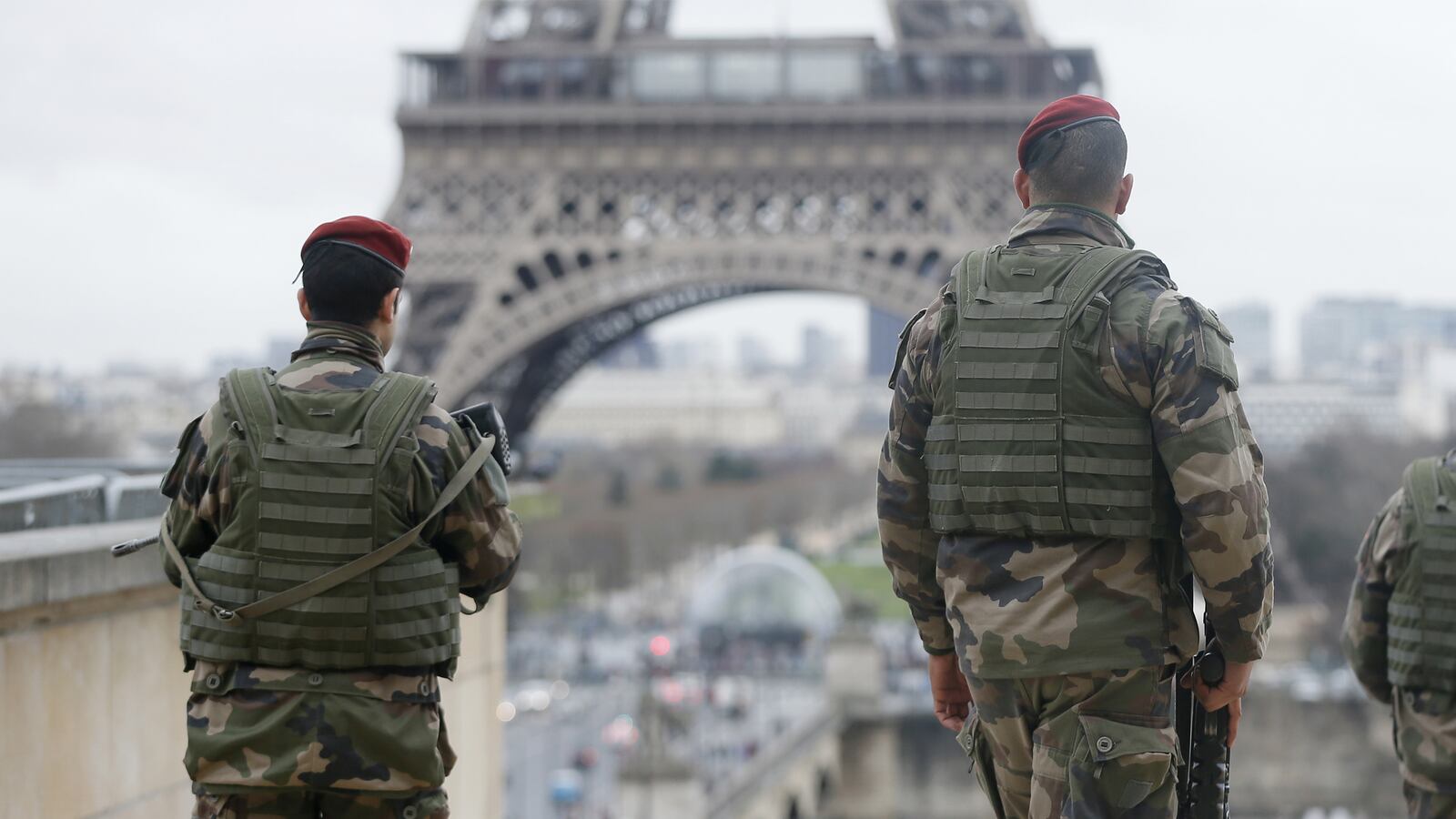In late February, some 50 Chinese tour operators gathered in Paris’s main police control center, where images of some of the city’s most well-known landmarks were displayed in real time on numerous flat-screen monitors. There was the iconic Eiffel Tower, of course, as well as the Invalides Dome, Notre Dame, the Champs-Élysées, and other sights that comprise the must-see list of every Paris first-timer.
This CIA-like view of the city was part of a recent push by the government to reassure spooked international visitors that not only was it business as usual at the Eiffel and other top tourist spots, but that the monuments were carefully monitored and under high security.
“The situation is better than what we expected before we came,” tour operator Kevin Li told France 24 from the control room. “Now we witness the real situation of Paris life, the real experience, rather than…the imagination.”
Ironically, Paris’ ability to stir the imagination of visitors has long been one of its draws. Before even finalizing an itinerary, travelers have typically anticipated a gauzy, cinematic version of the city that is nourished in part by films, books, and myriad Instagram accounts that convey an endless procession of sunsets, Haussmannian buildings, and pastel-hued macarons. However, after the Nov. 13 attacks, the myth began to veer into darker territory. No longer the postcard-perfect backdrop for personal fantasies, the city had suddenly morphed into a locale that was unpredictable and dangerous. For many tourists, this new image of Paris was so unsettling that they’ve avoided the city altogether.
Although it is too early to know the full impact of the attacks on Paris’s tourist industry, it has been hit hard. Hotels, museums, and chateaux have seen a 20 percent drop in visitors, according to a February report on France TV Info. The number of Japanese visitors fell by nearly 23 percent, while the number of Russian tourists was down by 37 percent. In 2015, 1.2 million Chinese visitors came to the capital, but since the attacks visa applications have plunged by 30 percent.
In the weeks following Nov. 13, U.S. travel agencies have also seen an uptick in Paris-shy visitors.
“It was a traumatic event and people are still feeling the effects of that,” Yolande Kamins, the owner of Los Angeles-based Enchanted France, told The Daily Beast. She said that although Paris bookings were down after the attacks, business is picking up again.
“Americans seem less deterred, maybe because they are more used to the threat [of an attack],” she added.
Other American tour operators report similar post-attack sluggishness followed by a rebound.
“We did see an immediate slowdown in new bookings for France and a considerable increase in bookings to Scandinavia, Spain and Portugal and Eastern Europe,” Paul Wiseman, the president of Trafalgar U.S.A., told the Daily Beast in an email. “That continued through to Christmas, however normal booking patterns have returned since the New Year.”
Paris tourism officials are doubtless hoping the see a similar uptick in other international visitors, not least the Chinese, who typically spend three times as much on a visit to the City of Light as Americans.
Indeed, the city’s attempts to lure Chinese travelers back didn’t end with the reassuring control-room tour. The Chinese delegation was also treated to a private visit to the famed Galleries Lafayette department store and a cabaret show.
City officials reportedly rolled out a similar welcome for Paris’s other big-spending visitors, the Japanese, in mid-January. Meanwhile, Paris Mayor Anne Hidalgo traveled to Japan at the end of February, where she urged the Japanese to give Paris another chance.
“Come to Paris,” she said during a speech in Tokyo. “We have suffered, of course, but now we are living, working, going out.”
In addition to reassurances about security in the capital, Hidalgo and her entourage also sought to clarify the state of emergency, which many Japanese have reportedly associated with a curfew that restricts free movement in the city.
Here in Paris, the Japanese themselves are mobilizing to lure their compatriots back to the city. However, the group of Japanese tour operators is targeting a menace that has nothing to do with security. Rather, they’ve launched a cleaning operation at some of the most sought-after sights, including the Eiffel Tower’s Trocadéro Gardens. According to a March 9 article in Le Figaro, Paris’ less-than-pristine streets have been off-putting to Japanese visitors who are accustomed to comparatively spotless Tokyo. While it’s hard to know what effect cleaner monuments will have on tourist figures, given that so-called “Paris syndrome”—a tendency to romanticize the city to such an extent that the less-rosy reality causes severe psychological distress—disproportionately affects Japanese visitors, it can’t hurt.
Despite its supposed potential for mental anguish (Paris syndrome has never been proven to be a bona fide malady) the idealized image of the capital is what officials are setting out to restore in the minds of international visitors. On March 1, the government announced a EURO 2.5 million marketing initiative to further reassure concerned tourists. According to an official release, the campaign will use social media to promote travel to France and will be deployed across 16 strategic markets.
Back in the U.S., Trafalgar’s Paul Wiseman welcomed the news.
“Negative news coverage is extremely powerful, and often ultimately unfair to destinations,” said Wiseman. “People need to see that Paris and France are open for business. France’s rich history, culture and incredible food has always been romanticized by Americans and that hasn’t changed.”
On Sunday, groups of tourists wandered around the Eiffel Tower, where they snapped selfies and joined an ever-growing line for the elevator to the top. Armed soldiers patrolled the tower’s base and the crisp air buzzed with the sound of numerous languages: English, French, Mandarin, Russian, and Arabic. Although the crowd was thinner than usual, the enthusiastic visitors to the city’s storied monument were undeterred by the frightening events that had rocked the city exactly four months ago.
“There is a danger everywhere,” Hezhuang, 19, who is in the city on a travel and study program, told The Daily Beast. “Sometimes you need some courage and sometimes you need to take risks.”
Other visitors agreed.
“In the back of your mind you know it happened, but Paris can’t die,” 23-year-old Londoner Adlen Bani, who was visiting Paris for the first time, told The Daily Beast.
“I love it here,” she added. “It makes me feel so alive and free.”
With that she set off in the direction of the Trocadéro, her red beret, matching jacket, and Chanel earrings embodying the whimsical image many foreigners hold of the perfect parisienne.






